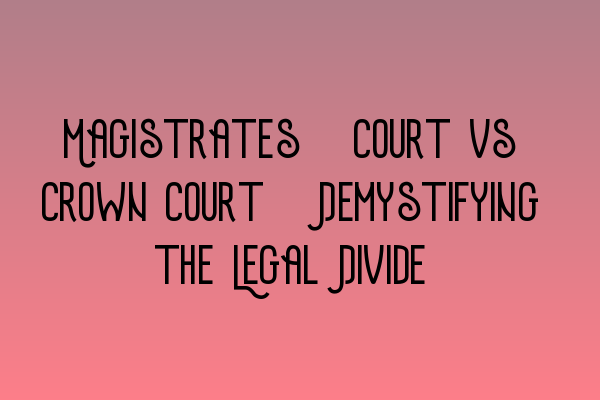Magistrates’ Court vs Crown Court: Demystifying the Legal Divide
Welcome to SQE Criminal Law & Practice Law UK, where we aim to provide you with clear insights and guidance on various aspects of the legal profession. In this blog post, we will dive deep into the differences between Magistrates’ Court and Crown Court, two integral parts of the UK’s criminal justice system.
Understanding the Basics
Magistrates’ Court and Crown Court are distinct entities within the criminal justice system. Each court plays a crucial role in the administration of justice, but they differ in terms of jurisdiction, sentencing powers, and the types of cases they handle.
1. Magistrates’ Court
Magistrates’ Court is often the starting point for criminal cases. It is presided over by a bench of lay magistrates or a district judge. This court deals with minor offenses, known as summary offenses, such as traffic violations, petty theft, and low-level assault.
One significant advantage of Magistrates’ Court is its accessibility and efficiency. It processes a vast number of cases quickly, ensuring a swift resolution for both defendants and victims. The sentencing powers of this court are limited, with a maximum imprisonment term of six months for a single offense.
If a case is more complex or serious, it may be sent to the Crown Court for trial. However, the majority of criminal cases are concluded in the Magistrates’ Court itself.
2. Crown Court
Crown Court handles more serious criminal cases, including indictable offenses, such as murder, robbery, and sexual offenses. It has the authority to conduct trials with a jury, composed of unbiased members of the public. A judge, who is legally qualified, presides over the proceedings.
The Crown Court offers a higher level of legal expertise and allows for fair and just trials. The sentencing powers of this court are significantly broader, ranging from community orders to life imprisonment for the most severe offenses.
A key distinction of the Crown Court is that it has the power to consider cases referred by the Magistrates’ Court for sentencing or if the defendant pleads guilty in a Magistrates’ Court but the offense is too serious to be dealt with there.
The Decision-Making Process
The decision to transfer a case from Magistrates’ Court to Crown Court lies with the Magistrates’ Court. This may occur if the offense is exceptionally serious or involves complex legal issues that require the resources and expertise available at the Crown Court.
Once a case reaches the Crown Court, it follows a structured trial process involving the presentation of evidence, cross-examinations, and closing arguments from the prosecution and defense. The jury then deliberates to reach a verdict.
Conclusion
Magistrates’ Court and Crown Court differ significantly in their jurisdiction, sentencing powers, and ability to handle complex cases. While Magistrates’ Court deals with minor offenses efficiently, Crown Court takes on more serious cases and offers a robust judicial process.
If you are considering a career in criminal law, it is vital to understand the role of both courts and the nuances of each. At SQE Criminal Law & Practice Law UK, we offer comprehensive preparation courses for the SQE 1 and SQE 2 exams, ensuring that you are well-equipped to navigate the legal profession. Check out our SQE 1 Practice Exam Questions and SQE 1 Practice Mocks FLK1 FLK2 to enhance your knowledge.
To learn more about our SQE preparation courses, visit our page on SQE 2 Preparation Courses and SQE 1 Preparation Courses. Stay updated with the latest SRA SQE Exam Dates by visiting SRA SQE Exam Dates.
Thank you for reading, and we hope this article has clarified the legal divide between Magistrates’ Court and Crown Court. For any further assistance or queries regarding SQE preparation and criminal law, feel free to reach out to us.
